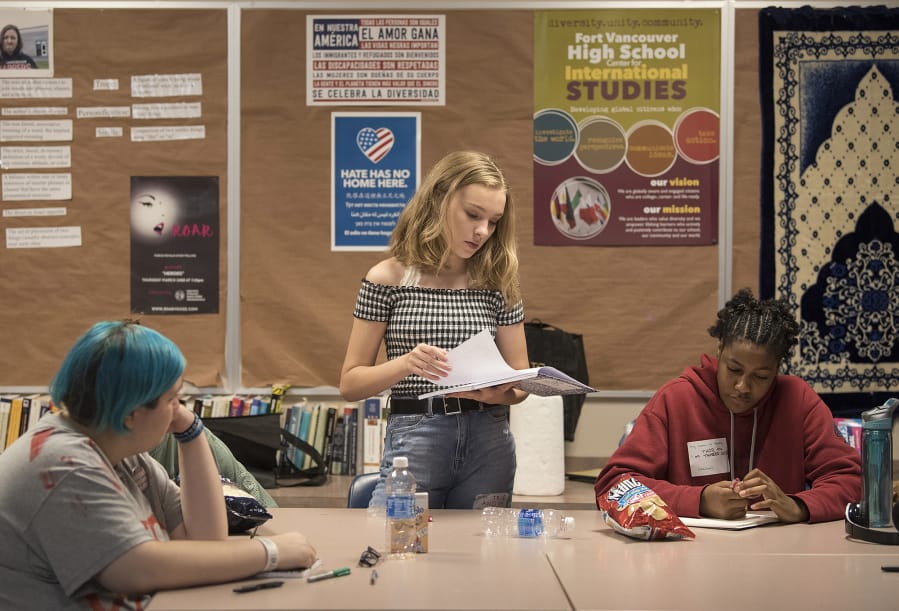Myrainah Blancas gathered her courage and started reading aloud an original story about sexual assault by a supposed friend.
Erika Worth stopped her and made one suggestion: change all your third-person references to “she” who was assaulted into first-person references to “I.” Bring it closer, she counseled. Even though it’s scary, don’t play it safe.
The change made a tale that was serious and important, yet still a little removed and remote, into a powerful work of up-close intimacy and searing pain. Blancas, 17, trembled and cried as she described inviting the guy she thought was her buddy over to her house, where he chose to ignore her screams of “no!”
Afterwards, she felt suicidal and mistrustful of boys, who can never be her friends, she concluded. Blancas now hates wearing dresses, she added, because they make her feel vulnerable.
“I attempt to rip out these pages from the book of my life but they keep coming back,” she said. “My body is a piece of art that was meant to be handled with care.”
When she was done, storytelling coaches Worth and Nikole Potulsky sang her praises. “You made something awful into something really beautiful,” Potulsky said. English teacher Ben Jatos, who heard an earlier version of this tough tale, called Blancas a storytelling “beast.” And fellow storyteller Blue Jackson, 18, asked for permission to give Blancas a hug.
“When I’m thrown into a situation like this,” Jackson said, “I can’t help but feel what people are feeling.”
That’s exactly what Worth wants to happen at the Kiggins Theatre on Thursday night, when her “ROAR: Fierce Female Storytelling” series trains the spotlight on girls, ages 12 through 18. Worth started ROAR a couple of years ago in order to give women a venue to build community and explore the sorts of stories they need to tell but usually don’t or can’t; Thursday night will be the second annual “Girls ROAR” performance, specifically designed to let the youngest female storytellers have their say.
And what is this year’s crop of 10 storytellers talking about? Gun violence. Gender identity. Racism and police brutality. Mental health. Religious discrimination and the strength of faith. And even, simply, female friendships that go “toxic,” and the guilt and confusion that result.
That’s what 13-year-old True Ware spoke about as the group workshopped stories, and the whole idea of personal storytelling, on a recent Thursday morning in Jatos’ classroom at Fort Vancouver High School. Ware uncomfortably described a childhood best friendship, now gone cold or maybe worse, and confessed her own role in the breakup. She’s got two voices in her head these days, she said — the one that likes her, mostly heard during the daytime, and the one that comes out at night and worries she’s “a bad person,” she confessed.
Early female friendships are like that, storytelling coach Summer Neville affirmed: intense and passionate. The loss of your first one can hurt more than a romantic breakup later in life, she said. “It’s a common thing. Everyone can relate,” she told Ware.
Girls aren’t raised to trust one another, Worth added — they’re mostly taught to judge and gossip — but ROAR is a place where difficult truths can get shared safely. Not every story has to be painful and fearful, she said, but the best stories will feel like they really matter. “What I ate last night” might turn out interesting or maybe amusing, she said, but probably isn’t going to grip listeners’ emotions.
Fifteen-year-old Kyah Williams-Jones’ story idea was plenty gripping. She talked about her fear of getting stopped, or a family member of friend getting stopped, by police. “Knowing my life could end in that moment causes tremendous fear,” she said. “I’m not trying to be disrespectful,” she added, but there’s no forgetting all the news in recent years about African-Americans being killed by police. “Will I be next?” she can’t help wondering.
The coaches had a main message for these young storytellers: make it personal. Many of their first drafts were heartfelt responses to the broadest of social problems — racism, sexism, shaming, violence — but Worth and her partners urged them to get beyond “position statements” and draw upon specific, detailed memories of experiences that speak to those issues.
If there’s an overall theme here, Worth said, it’s hope. She was moved to tears more than once by the girls’ stories and the serious intent behind them that morning. “What were we talking about when we were kids — football and beer? We need these kids. They’re really going to spread the hope,” she said. “I look at them and think, we’re going to be OK.”
“They are the people we aspire to be,” Jatos said.




